Mar 11, 2021
One year later: Raptors reflect on the night COVID stopped the NBA
One year after the COVID-19 pandemic halted play on the 2019-20 NBA season, members of the Toronto Raptors reflect on the night everything changed.
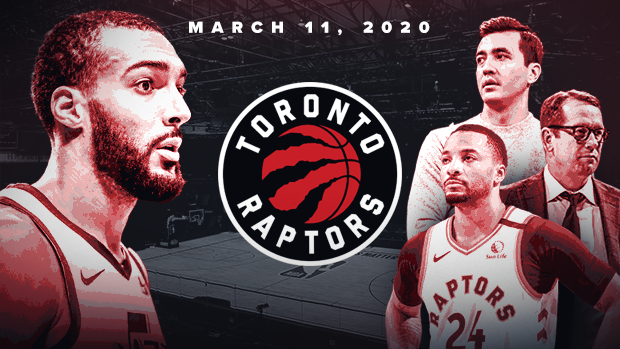
In the days – and even in the hours – leading up to 9:27 p.m. ET on March 11, 2020, few realized the extent to which things were about to change.
At the time, new details about the novel coronavirus and its devastating effects were emerging every day, but it still seemed like a distant threat for a lot of people in North America. The evening of March 11 was when it began to feel very real.
When Utah Jazz centre Rudy Gobert tested positive for COVID-19, followed swiftly by the NBA’s decision to suspend its season indefinitely, it sent a message that transcended sport.
As the last team to face Gobert and the Jazz, the Toronto Raptors were at the forefront of that evening. It’s a night they’re not likely to forget.
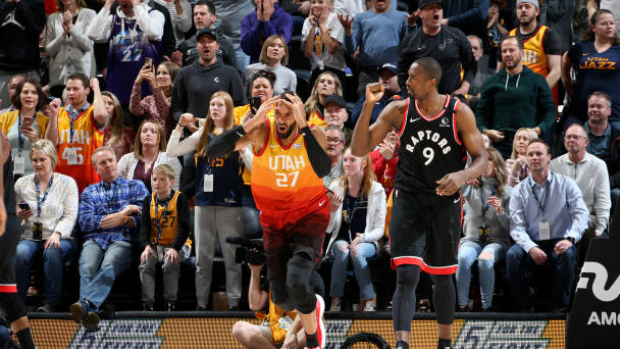
LEAD UP
On Tuesday March 10, 2020, the Raptors returned home from a 10-day West Coast trip that included stops in Denver, Phoenix, San Francisco, Sacramento and, finally, Utah. Gobert logged 32 minutes against Toronto before getting ejected late in the fourth quarter.
With the threat of the coronavirus growing, the NBA implemented a series of precautionary measures earlier in the week, one of which intended to limit the risk of exposure to its players by restricting access to team locker rooms. The league also had calls scheduled with its board of governors to prepare for the possibility of playing games without fans in arenas.
Bobby Webster, Toronto Raptors general manager: “In January, if I remember correctly, a few of us from the front office actually went to Europe and it was kind of already on peoples’ radars there at the time, so you started to see the precautions in place. And then we went on the West Coast trip in early March, and I know on that trip the NBA had sent out a bunch of protocols.”
Matt Devlin, Toronto Raptors play-by-play announcer: “There was a build up over the course of that trip that you knew something was coming. Travelling from Arizona to San Francisco, to me, was like, okay, there’s something on the horizon. And then we went into a couple back-to-backs, so there wasn’t much time to get out. But you could tell in San Francisco that there was something on the horizon because any pharmacy that you went to you could not buy hand soap or hand sanitizer. It was already sold out.”
Webster: “I just remember we were in San Francisco and there were some cases there, so everyone was very prepared. We just didn’t have the same kind of education of what we needed to do, but definitely it was keep your hands washed, let’s not congregate when we don’t have to, don’t go out in public, don’t go to restaurants. So I think we were already in that mindset.”
On the evening of Wednesday, March 11, members of the Raptors’ organization were split between two different events in downtown Toronto. Head coach Nick Nurse was launching his foundation with a private party at Hotel X, just east of the team’s practice facility on the grounds of Exhibition Place.
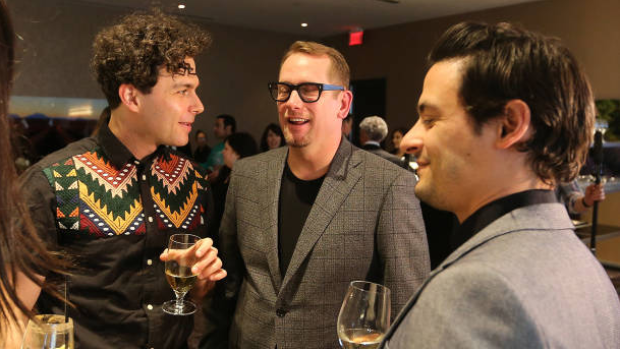
Devlin: “It was a rare night out for me and my wife, Erin, and we were enjoying the evening, as well as I was hosting it… It was a celebratory night. It was an unbelievable collection of artists – the Arkells and just the lineup that Nick’s foundation put together. It was a joyous evening. I didn’t feel any apprehension leading up to it. I didn’t feel any anxiousness because at that stage, while you’re starting to understand that there was something going on, I don’t think anybody understood the severity of it. Certainly I didn’t. It ultimately became a surreal night as the night went on.”
Max Kerman, Arkells lead singer: “I was really excited. The band had been in L.A. recording previous to that event, and I think we had just got back to Toronto. Nick had asked me to be on the board for the foundation, which was a really exciting opportunity to be involved in. We play every kind of show – big shows, little shows, festivals, and we’ve done some private events. But we knew there would be some Raptors in the house and some Toronto big shots and so we were kinda looking forward to that. It was sort of a different kind of experience as far as a concert goes. And we also knew that Daniel Caesar was on the bill and I’m a big fan of Daniel Caesar. So we were really looking forward to it. And also, the other thing, Nick was going to get up and do some songs with us.”
A 10-minute drive away, at the Ballroom on John Street, Norman Powell was holding his second annual BasketBowl event in support of Big Brothers Big Sisters of Toronto.
Kate Beirness, TSN anchor, Raptors sideline reporter: “I found out [that I was hosting the event] the day before. I had just gotten back from my winter vacation… When I got back I did think to myself, it did cross my mind for sure. I just got off a plane, should I be doing this? And then I thought, no, maybe I’m overacting to the situation. And then speaking with Big Brothers Big Sisters, who were putting on the event with Norm, we had a chat before the event, and they talked about all the precautions they were taking.”
Norman Powell, Toronto Raptors guard/forward: “It wasn’t the same as the first year, where we were bowling with the fans, interacting with them, talking to them, signing autographs and things like that. They were sanctioned off and it was literally like them watching the team bowl and it was very limited interaction. They did a great job at the event of keeping the distance between us and the fans because we didn’t know who had [the virus], or if anybody on the team had it at the time. I felt safe in that environment.”
6 p.m. – 7 p.m.
Roughly 200 invited guests arrived at Nurse’s event and gathered in the hotel’s third-level foyer for the cocktail hour. Meanwhile, several players – including Pascal Siakam, Fred VanVleet, Chris Boucher and Matt Thomas – joined Powell for a night of bowling.
Kerman: “It felt a little funny. [The coronavirus] definitely was somewhat of a talking point. I think people were doing the fist bump or the elbow instead of the handshake, but kind of doing it jokingly. They were like, okay well I guess we have to follow these protocols, no hugs today, no handshakes today, let’s just do a little fist bump instead. But I think most people weren’t doing it like it was that important, it was more like a little tongue in cheek.”
Powell: “There was some talk about it, like about what would happen. Most of us were like, there’s no way they’re going to shut the league down. We figured the first thing was making sure there were no fans [in the arenas] and things like that. We didn’t think that they would go into a full hiatus.”
Kerman: “I remember thinking that anybody that was making a big deal about the coronavirus was overacting to me. I think Mike [DeAngelis] in our band felt a little more nervous about what the future might look like and I’m usually glass-is-half-full, Mr. Optimistic about things, so I don’t think I took it very seriously. Clearly I was very wrong there.”
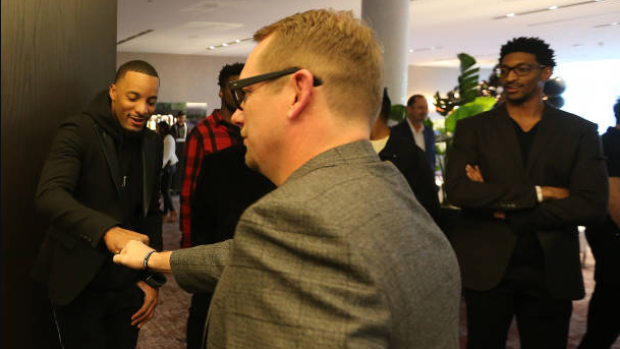
8 p.m. – 9:31 p.m.
At 8:30 p.m., the game between the Jazz and Thunder was mysteriously delayed, with players asked to leave the court just before tip-off in Oklahoma City. At 9:15 p.m., actor Tom Hanks announced that he and his wife, Rita Wilson, who were in Australia for pre-production of a movie, had tested positive for COVID-19.
Powell’s event wrapped up around 9 p.m. and a few players, including VanVleet, went to catch the end of Nurse’s event. The Arkells were scheduled to take the stage just after 9:30 p.m., with Nurse accompanying them on guitar and piano for four songs.
At 9:27 p.m., just as the band was getting ready to go on, the Gobert news broke. Four minutes later, the NBA announced that it was putting the season on hold.
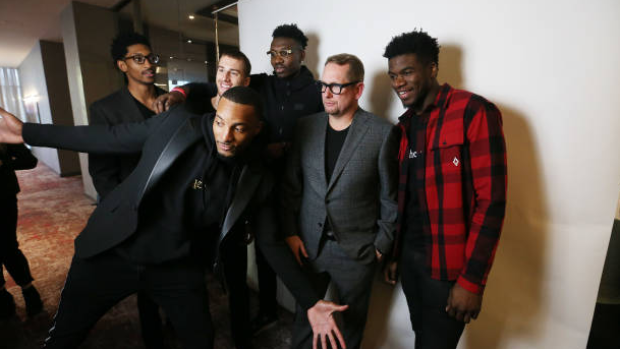
Kerman: “I just remember thinking, holy s--t, the Raptors just played the Jazz two days ago, they just came from Salt Lake City, and I just took a photo with Serge [Ibaka] and Marc [Gasol], who would have been the guys guarding Rudy. So it’s like you kind of do the thing from The Usual Suspects, you know? Where you start piecing things together in your mind.”
Devlin: “It was an unbelievable mobilization of the team doctors who were there. You had [team medical director] Dr. Paul Marks and his wife, you had [VP of player health and performance] Alex McKechnie who was there, and you could sense that something was happening because they were receiving phone calls. So they’re out of the room and that’s when you kind of understand that this is serious.”
Kerman: “At the table right in front of the stage, Fred VanVleet was sitting there, and I remember thinking, oh, it will be fun to play for Fred. But then pretty quickly I realized that as soon as we started [playing] none of the Raptors were in the room anymore. I was like, okay, they had to get the hell out of there. And I remember Nick just giving me one of those looks, like this has turned into a bit of strange one, but let’s just go with it and have a good time. You know how Nick is super positive. It was a short set and it felt like the room was a little distracted and also sort of filtering out as it was going, which of course made sense because I think everybody was quite uneasy about being in a small room and worrying about Tom Hanks and Rudy Gobert. So yeah, it was definitely one of the most memorable shows we’ve ever played.”
Powell: “I left [my] event and I went straight home. I just remember being in my apartment. I was watching a movie and my phone just started blowing up. I just remember getting texts from [director of team security] John Altilia, [head athletic trainer Scott McCullough] and [McKechnie] saying that we had to go to the hospital to get tested because we were exposed. So it was just crazy. I looked at my phone for a minute and it was like, man, this is really happening.”
10 p.m. – 2 a.m.
Kerman: “Basically everybody got the hell out of there. I think everybody just wanted to peace and just get home. I feel like the room cleared out pretty quick. Nick was hosting the night, though, so he stuck around and thanked everybody and was his normal collegial self. But yeah, I think most people got home.”
Webster: “I had been on a long road trip, so I was spending some time with my family. I was not at the event. But as soon as it happened the immediate calls were to Nick, to [director of communications] Jennifer Quinn, [team president] Masai [Ujiri] and our doctors just to figure out, okay, where is everybody at right now, does everybody know? The next course of action was, can we go get everyone tested? So I remember kicking that more into high gear, which was, okay, how do we get there, how do we actually communicate with people, how do they actually get to the hospital, how do they get tested, how long will it take, and then how long will the results take? [North York General Hospital] was able to fit us in as one of the first groups to get tested. There was a bit of discussion over should we go or should we not? But I think because everyone essentially qualified as a close contact – which we’re learning now what that means one year later – with Rudy, that was for sure a reason for everyone to get tested within the group. We have an internal app that we use to communicate all of our messaging. It’s essentially a group text… We weren’t exactly sure how long it would take to get tested but I think it was probably between 12:00 - 2 a.m. I think we had probably around 50 people on that trip, including some of the media, so everybody went there and got tested.”
Powell: “I just remember driving to the hospital and getting tested and being freaked out because that’s when they were doing the full nasal swab and going all the way to the back of your nose. So I was freaking out about the test, but I think I remained positive about the whole thing. I was very fortunate because I remember I got hurt like 30 seconds into the game [against the Jazz], so I think that really helped me in hindsight with everything that happened. If I played my full normal 36-37 minutes, because I was starting and guys were hurt, I would’ve had a higher risk of exposure.”
Aftermath
Most of the Raptors who were tested late on Wednesday night or early Thursday morning received their results late on Friday. Fortunately, all of them came back negative. As a precaution, each member of the team’s travelling party was told to quarantine in Toronto for 14 days.
Early Thursday morning, the G League followed the NBA’s lead and put its season on hold. A few hours later, FIBA also suspended its competitions. Within 24 hours, the International Tennis Federation, Major League Soccer, the NHL, MLB, NCAA and PGA all hit pause on their seasons, tournaments or competitions. By the end of the week, just about everything on the continent – schools, businesses, places of worship, amateur sports leagues, camps and clubs, and all non-essential stores – had been shut down and people were being asked to stay at home.
At the time, the United States had roughly 1,200 confirmed cases of COVID-19 and 38 deaths. The Canadian government had confirmed 117 cases, with the country’s first death coming earlier in the week.
One year into the pandemic, there have been nearly 29 million cases of COVID-19 in the U.S. alone, according to the CDC, and more than 890,000 cases in Canada. The recorded death toll in North America is approaching 550,000.
Powell: “It’s something that I’ll never forget in terms of being a part of a league that I feel like kind of set the standard for health and safety for their players. Right after the league shut down you started to see the ripple effect, the domino effect, of other leagues taking the virus more seriously. I’ll definitely remember how quick and swiftly they acted and responded in those hours after the breaking news.”
Beirness: “I will never forget that day for the rest of my life, there is no doubt in my mind. I can remember reading that text. I can specifically remember it popping up on my phone and then looking up and looking around the room because I knew right then and there that something absolutely drastic was going to happen. And I think too, because we live in sports and sports are always that escape and that fun part of life for us, and when that stopped I thought, oh my goodness, this is way bigger than any of us – any game, any sport. And I kinda had a sense in that moment that this world may be changing right in front of our eyes, and clearly it did.”
Kerman: “When you play as many shows as we have, the shows really blur together at a certain point. But this one was so unique. The fact that it was a small room, Hotel X, the Raptors were in attendance, Matt Devlin was hosting it, Nick Nurse was going to jump on stage – all those variables made it a very memorable show to begin with. And then also it being the night the world shut down makes you remember it that much more and it makes it that much more unique, obviously, because that was the last time the Arkells played in front of a crowd.”
Webster: “I think that will always stick with me. Your adrenaline’s going, your stress level is pretty high, so you’re kind of in the moment. I was thinking about all of our abilities to come together and how quickly we shifted all of that energy that we [normally] use to focus on preparing for basketball to the health and safety of the team. So that was kind of cool… I think we’ll probably always remember that moment when things shut down.”

